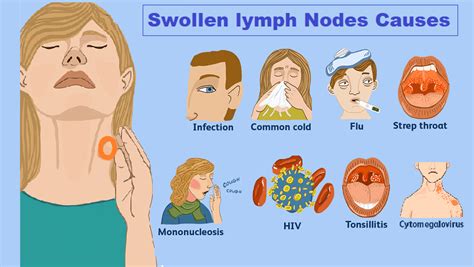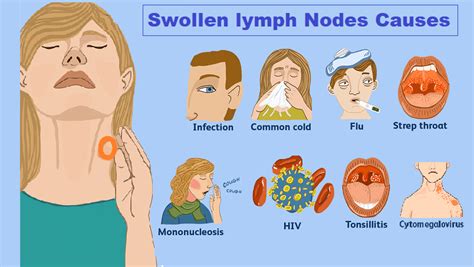Intro
Discover the causes of jaw lymph node swelling, including infections, dental issues, and cancer. Learn about symptoms, diagnosis, and treatment options for swollen lymph nodes in the jaw area, and understand when to seek medical attention for this common condition.
The swelling of lymph nodes in the jaw area can be a cause for concern, as it may indicate an underlying infection, inflammation, or other health issues. Lymph nodes are an essential part of the immune system, acting as filters to trap and eliminate harmful substances, such as bacteria, viruses, and other foreign particles. When these nodes become swollen, it can be a sign that the body is fighting off an infection or disease. In this article, we will delve into the possible causes of jaw lymph node swelling, its symptoms, diagnosis, and treatment options.
The jaw area is home to several lymph nodes, which are responsible for draining lymph fluid from the face, neck, and scalp. These nodes can become swollen due to various reasons, ranging from minor infections to more serious health conditions. Some of the common causes of jaw lymph node swelling include dental infections, such as abscesses or tooth decay, viral infections like the common cold or flu, and bacterial infections like strep throat or sinusitis. In some cases, jaw lymph node swelling can also be a symptom of more serious conditions, such as lymphoma, tuberculosis, or HIV/AIDS.
It is essential to seek medical attention if you experience persistent or severe jaw lymph node swelling, as it can lead to complications if left untreated. A healthcare professional will perform a physical examination, take a medical history, and may order diagnostic tests, such as blood tests, imaging studies, or a biopsy, to determine the underlying cause of the swelling. Treatment for jaw lymph node swelling depends on the underlying cause and may involve antibiotics, antiviral medications, or other therapies to manage the condition.
Jaw Lymph Node Swelling Symptoms

Types of Jaw Lymph Node Swelling
Jaw lymph node swelling can be classified into different types, depending on the underlying cause and the location of the affected nodes. Some common types of jaw lymph node swelling include reactive lymphadenopathy, infectious lymphadenitis, and neoplastic lymphadenopathy. Reactive lymphadenopathy occurs when the lymph nodes become swollen in response to an infection or inflammation, while infectious lymphadenitis is caused by a bacterial or viral infection. Neoplastic lymphadenopathy, on the other hand, occurs when the lymph nodes become cancerous, which can be a sign of lymphoma or other types of cancer.Causes of Jaw Lymph Node Swelling

Diagnosis of Jaw Lymph Node Swelling
Diagnosing jaw lymph node swelling involves a physical examination, medical history, and diagnostic tests. A healthcare professional will perform a thorough examination of the jaw area, checking for signs of swelling, tenderness, or other abnormalities. They will also take a medical history, asking questions about symptoms, medical conditions, and medications. Diagnostic tests, such as blood tests, imaging studies, or a biopsy, may be ordered to determine the underlying cause of the swelling.Treatment Options for Jaw Lymph Node Swelling

Home Remedies for Jaw Lymph Node Swelling
In addition to medical treatment, there are several home remedies that can help alleviate symptoms of jaw lymph node swelling. Some common home remedies include: * Applying a warm compress to the affected area to reduce pain and swelling * Gargling with salt water to reduce inflammation and kill bacteria * Taking over-the-counter pain medications to manage discomfort and pain * Resting and avoiding strenuous activities to promote recovery * Eating a healthy diet rich in fruits, vegetables, and whole grains to boost the immune systemPrevention of Jaw Lymph Node Swelling

Risks and Complications of Jaw Lymph Node Swelling
Jaw lymph node swelling can lead to complications if left untreated, including abscesses, cellulitis, and sepsis. Abscesses can form when bacteria accumulate in the affected tissue, leading to a painful and potentially life-threatening condition. Cellulitis is a bacterial infection of the skin and underlying tissue, which can spread to other parts of the body if left untreated. Sepsis is a life-threatening condition that occurs when the infection spreads to the bloodstream, leading to organ failure and death.Conclusion and Next Steps

We invite you to share your thoughts and experiences with jaw lymph node swelling in the comments section below. If you have any questions or concerns, please do not hesitate to ask. Additionally, if you found this article informative and helpful, please share it with your friends and family to spread awareness about this important health topic.
What are the common causes of jaw lymph node swelling?
+Jaw lymph node swelling can be caused by various factors, including dental infections, viral infections, bacterial infections, lymphoma, and other health conditions.
How is jaw lymph node swelling diagnosed?
+Diagnosing jaw lymph node swelling involves a physical examination, medical history, and diagnostic tests, such as blood tests, imaging studies, or a biopsy.
What are the treatment options for jaw lymph node swelling?
+Treatment for jaw lymph node swelling depends on the underlying cause and may involve antibiotics, antiviral medications, pain relief medications, surgery, or other therapies.
Can jaw lymph node swelling be prevented?
+Yes, jaw lymph node swelling can be prevented by maintaining good oral hygiene, practicing good hygiene, and avoiding close contact with people who have infectious diseases.
What are the risks and complications of jaw lymph node swelling?
+Jaw lymph node swelling can lead to complications, such as abscesses, cellulitis, and sepsis, if left untreated.
